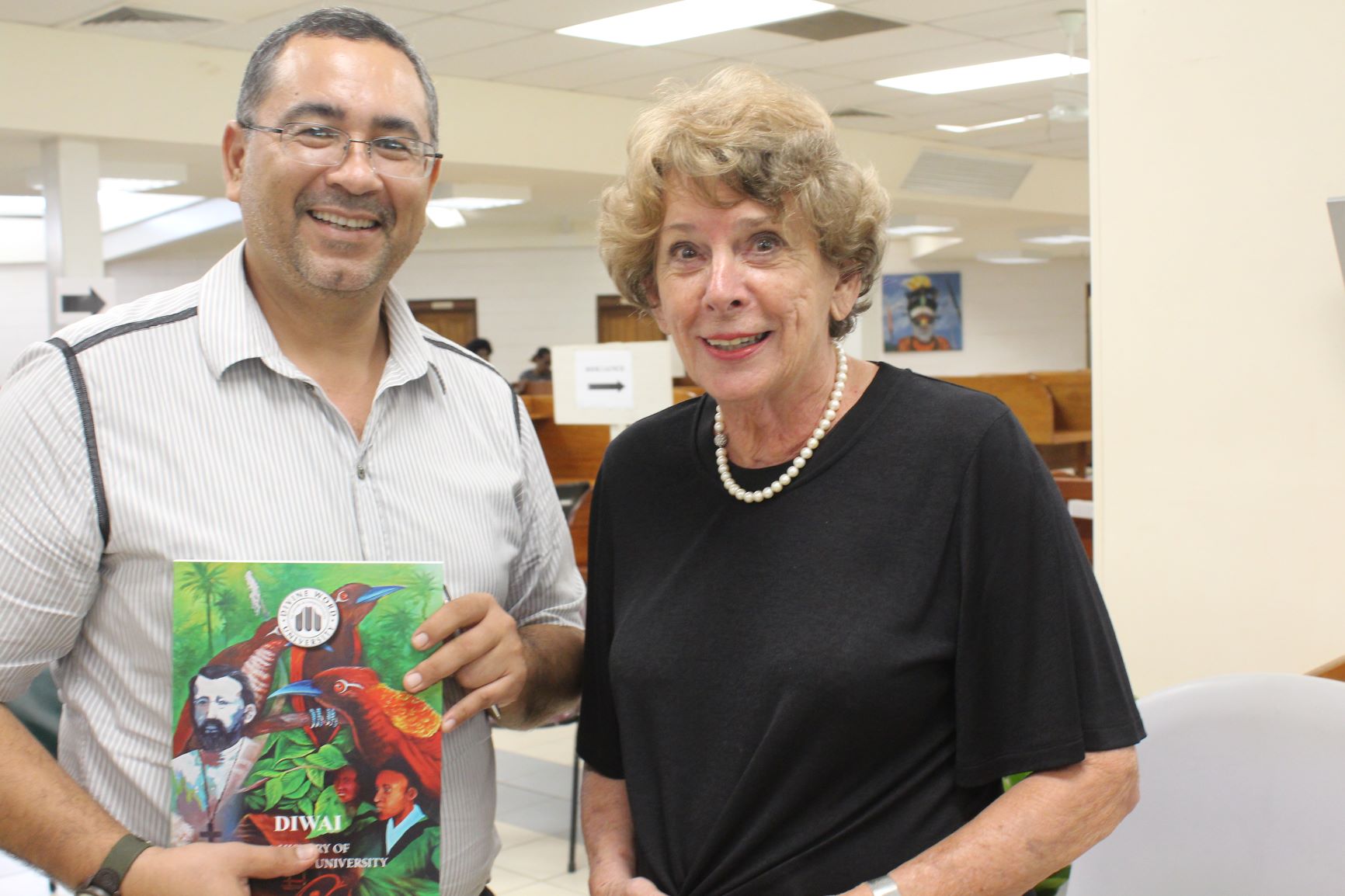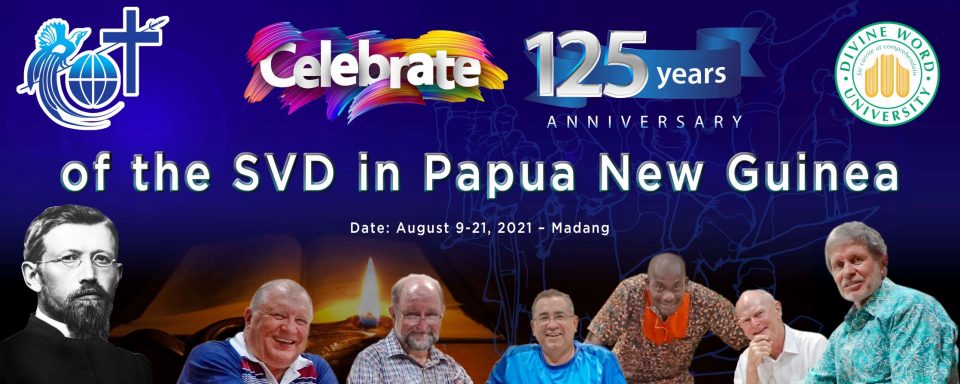“Life in the New Guinea of those days was in fact a severe test of faith and character (for the missionaries),” Dr. James Sinclair.
By KEVIN PAMBA
Over a year ago, Sir Peter Barter, Madang’s knight of the realm who in ‘shining armour’ continues to come to the aid of worthy causes, put his hand up to pay for the final editing and printing of a book on the history of Divine Word University (DWU).
The book published under the University’s DWU Press is titled “Diwai: A History of Divine Word University”. It is written by the late former kiap (Australian colonial era field officer)-turned-author Dr. James Sinclair, the prolific writer of 40 books on historical topics about Papua New Guinea.
Sir Peter delivered the printed books to DWU’s Madang campus in earnest and it was launched in the Friendship Library of the University in February last year. Jan Sinclair, the widow of Dr. Sinclair traveled up from Australia and launched the book on behalf of her late husband.

The Tok Pisin (PNG Pidgin) name “Diwai” for tree used in the title of the book is a colloquial often associated with Divine Word University. The label “Diwai” is actually a play on the pronunciation of the initials “D.W.I” (for Divine Word Institute, the predecessor of the university) coined by the students of the institute era. The students back then felt D.W.I was like a small tree and needed to be nurtured to grow up to a big tree that bears fruits or seeds. Today the name “Diwai” is used by the DWU sports teams, the alumni, incumbent students, and even by the university’s business arm (Diwai Enterprise Ltd) and the consulting firm (Diwai Pacific Ltd).
The DWU book is a must-read for those associated with the university from its start as DW High School in 1968 up to the present time.
Actually, the book is more than the history of the University – it tells the story of the Catholic missionary work as of the arrival of the first missionaries in Madang and mainland New Guinea on 13 August 1896. For our international readers, Divine Word University is a Catholic Church university in Papua New Guinea that started out as Divine Word High School in 1968. It was started by the Catholic congregation called the Society of the Divine Word or in Latin Societas Verbi Divini (SVD) with the support of the Holy Spirit Sisters (SSpS).
The DWU history book finalized in 2015, was Dr. Sinclair’s last work on PNG before he passed on. The book was put together to mark the 20 years of the University since it transitioned from Divine Word Institute which originally began as Divine Word Catholic High School.
One less known historical fact about the DW Catholic High School was that it educated many Papua New Guineans who went on to do great things in different professional fields like airline pilot (Captain James Makop, Captain James Siaguru, Captain Paul Kodor), judiciary (late Justice Nicholas Kirriwom), higher education administration (Joseph Sukwianomb), medicine (Dr. Susanna Khobu) among others. After the high school transitioned into Divine Word Institute in 1979, one great thing it did was retain its matriculation (Grade 11 and 12) program right up to 2000 when Divine Word University saw its last matriculation graduation to concentrate on university programs.
The ‘magic’ that the matriculation program did for DWI and DWU (in the early years) was it provided a constant supply of well-rounded and responsible Grade 12 graduates prepared to take on tertiary education with the Divine Word ethos at heart. The majority of the Divine Word matriculation graduates enrolled in the undergraduate programs in DWI (1979-1995) and later DWU (1996-2000) provided the core group of students who could maintain the Divine Word values and its ethos and impart them to Grade 12 graduates and non-school leavers that came from elsewhere in PNG.
The little known wonders that have happened in the lives of generations of young people from across PNG (and in recent years, the Pacific Islands) that came through the Divine Word High School to the Divine Word Institute continues to happen in Divine Word University, had their beginnings 125 years ago on 13 August 1896.
On that particular day, six Catholic missionaries from Germany sailed into the harbor of the little-known German outpost in the Pacific named Friedrich-Wilhelmsafen, now known as “Madang town”, to plant the seeds of the “Divine Word”.
The six missionaries led by Father Eberhard Limbrock were members of the Society of the Divine Word that Fr Janssen started on 8th September 1875. For his outstanding missionary work, which sent SVD missionaries to many parts of the world including China and PNG, Fr Janssen was later canonized by the Church as Saint Arnold Janssen.
The team led by Fr Limbrock, 36, to Friedrich-Wilhelmshafen in Kaiser-Wilhelmsland (mainland New Guinea covering Madang, Sepik region, Simbu, Eastern Highlands, Jiwaka and Enga) were Fr Franz Vormann, Fr Joseph Edweg, brothers Canisius Hautkappe (a mechanic by trade), Eustochius Tigges (carpenter and cabinet-maker) and Theodulph Schmidt (cook/tailor).
Fr Limbrock, a veteran to the mission field in China was assigned to lead the team to New Guinea by Fr Janssen.
The wonderful story of these pioneer SVD missionaries to Madang and mainland New Guinea and those that followed them including the Holy Spirit Sisters or Missionary Sister Servants of the Holy Spirit (SSpS) is well documented in the Divine Word University history book. The SSpS congregation of nuns was also founded by Fr Janssen with co-founders Sister Helena Stollenwerk (Mother Maria) and Sister Hendrina Stenmanns (Mother Josepha) in Steyl, the Netherlands on 8th December 1899.
Reading through the historical work of the SVD and SSpS missionaries as documented in the DWU history book one comes away appreciating the marvelous things they did for PNG in those trying times and in a territory vastly unknown to the outside world.
“The difficulties were real. New Guinea was a wild, almost unexplored country, far away from the familiar comforts of the Europe from which these missionaries had come.
“The climate was hot, humid, enervating,” writes Dr. Sinclair in the book.
“Life in the New Guinea of those days was in fact a severe test of faith and character,” continues Dr. Sinclair.
The SVD and SSpS missionaries, who despite the hardships stayed the cause over the succeeding decades in the name of Jesus Christ the Divine Word, went on to do so many wonderful things including establishing great institutions for the people of PNG.
Some of the landmark institutions the SVD and SSpS missionaries started include Divine Word University, Melanesian Institute, Word Publishing (publishers of Wantok newspaper and previously The Independent and Times of PNG), and the Wirui Press.
Since August last year, the SVD in particular began their commemoration of 125 years of missionary work in PNG. This will culminate in August this year with a conference in DWU Madang campus and other activities at the historical site at Alexishafen and so forth. The events will begin on the 9th of August and conclude on 21st August 2021. An SVD missionary and a senior academic in DWU, Fr Dr. Geovanne Bustos from Mexico are leading the organization of the symposium and related events. Congratulations and happy 125th anniversary to the Divine Word Missionaries in PNG and may you continue to do your great works in the name of the Divine Word, Jesus Christ, in the years ahead. The thousands of Papua New Guineans who benefitted from your great missionary work, owe their achievements in life and faith in Jesus Christ to your dedicated service over 125 years.
Dr. Kevin Pamba Ph.D. joined DWU in January 2000 as a lecturer in the Communication Arts program and has been with the university since.


